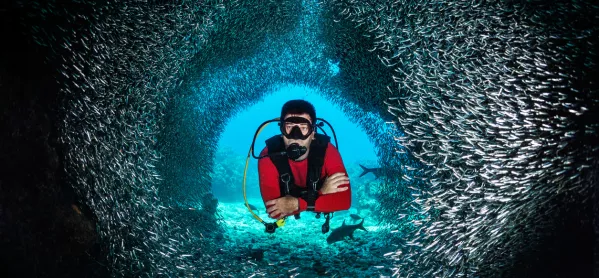At a previous school where I taught, there was an ongoing challenge for a member of staff to succeed in dating a visiting Ofsted inspector. Not many took up the challenge. Despite some of us knowing or perhaps even being married to an inspector, it was generally assumed that such an evening would be too driven by data, scrutiny, observation and a subsequent grading of everything.
But the image of the Ofsted inspector is having a much-publicised makeover this summer. Gone is the pallid, dull data-gatherer of old. Today we have the much more alluring prospect of the “deep diver”.
Wetsuit and snorkel
The change has set many a pulse racing. It’s as if Ofsted has moved into the manor at the start of a Thomas Hardy novel. The arrival has provoked much local tittle-tattle. What teacher in the country isn’t now all aflutter at the prospect of the new Ofsted calling in, donning the wetsuit and snorkel and deep-diving into our hearts for ever?
Turning Ofsted into a squad of deep divers was a neat move. As a chat-up line, the classic “I’m a deep-sea diver” hasn’t always worked, but today it’s a surefire winner. It not only suggests a fearless, exotic adventurer but also hints today at a potential Blue Planet Attenborough-style eco warrior. An irresistible figure, it seems.
Intensely boring
I wonder how long it took them to hit upon the term. The now familiar “drilling down” means exactly the same thing, but I suspect the chief inspector ruled that phrase out instantly. “We’re not having any of that corporate crap,” I like to imagine Amanda Spielman announcing to Sean Harford and the team. She would be right. As a phrase, “drilling down” has always been a big turn-off.
“Random plunge” may have been another option on the table for a short while, but it perhaps made the whole idea sound arbitrary and unscientific - which, of course, would be ridiculous. Besides, random plungers sound a bit dangerous. So that option went the same way as “drilling down”, as did the variously unsuitable “intensely boring” and “deep delving”.
Whereas “deep diving” fitted in so well with other aspects of Ofsted’s newfound persona. The new Ofsted inspector is supposed to be an altogether more interesting, outdoorsy, open-minded and more worldly kind of figure. So much so that those brave deep-diving HMIs are apparently going to hunt down and harpoon any headteacher guilty of “curriculum narrowing”. “Oh, how can I ever thank you, Deep Diver?”
Left swipe
Sadly, as with so many of those promising Thomas Hardy newcomers, I fear we are in for a big let down. Deep dive below the surface (it only requires the briefest of skinny dips) and we find that the “new” Ofsted turns out still to have the same key personality flaws as the old one. It is still too controlling, is still going to bring nothing to the relationship and it is still going to grade. For these reasons, a date from Ofsted is still one to avoid, still a left swipe on Tinder.
“I want Ofsted to be a force for improvement,” says the chief inspector. Well, in that case, why not go the whole hog and reform it properly? Keep the deep diving if you wish, but let the grading sink to the bottom of the sea. Unshackle those highly experienced inspectors from forever thinking about what grade to give and let their work include some properly formative and substantial work with schools.
For, as new Ofsted says itself (repeatedly), nothing works effectively in schools unless intent is linked to implementation and impact.
Stephen Petty is head of humanities at Lord Williams’s School in Thame, Oxfordshire





